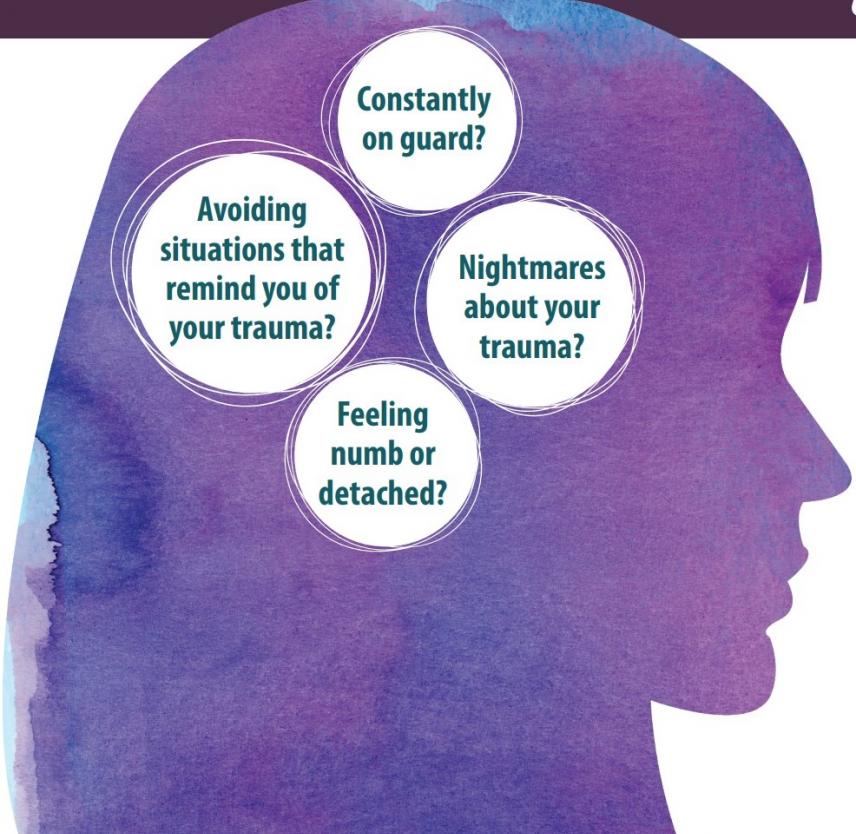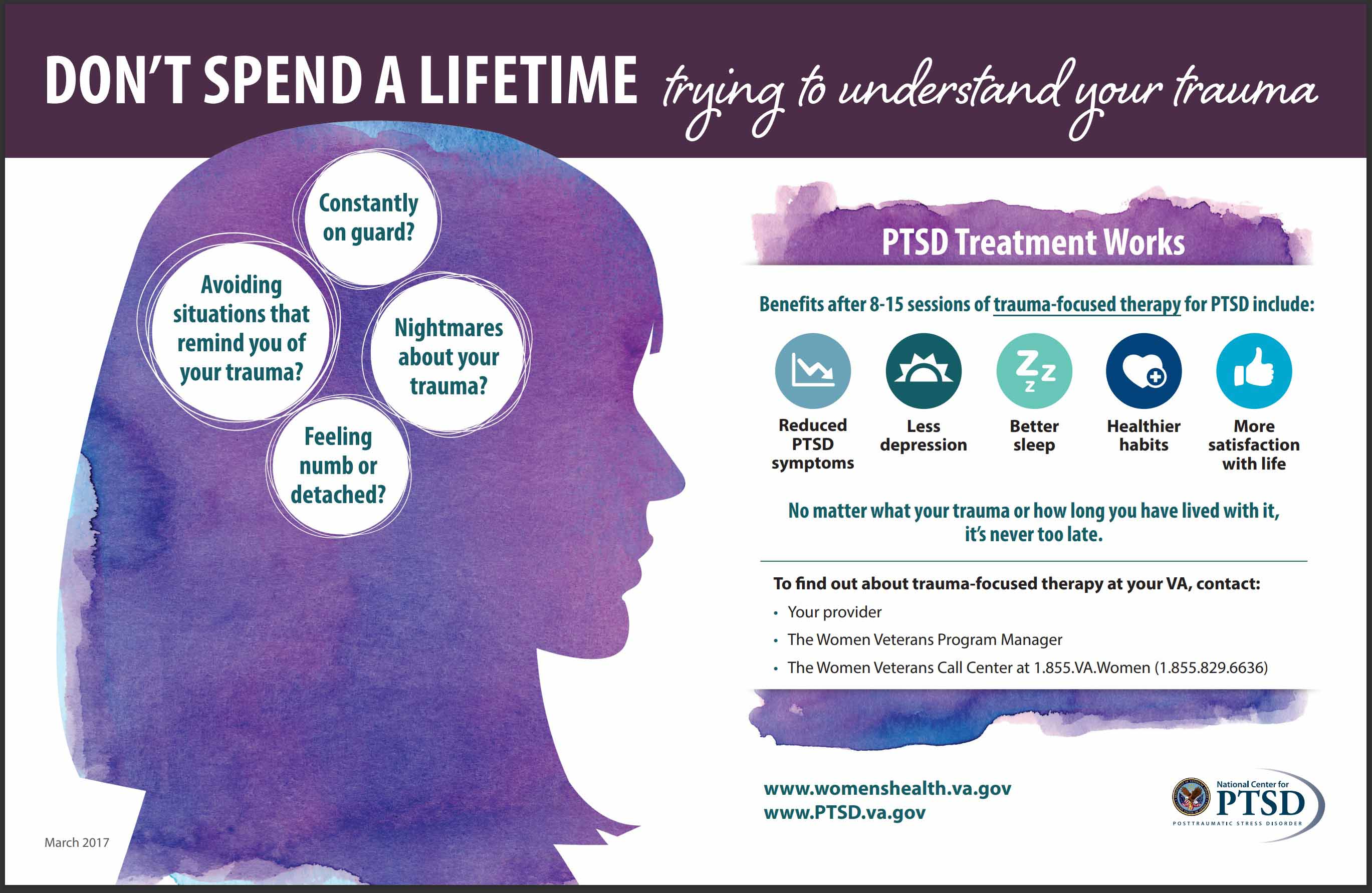
Trauma is common in women; five out of ten women experience a traumatic event. Women tend to experience different traumas than men. While both men and women report the same symptoms of PTSD (hyperarousal, reexperiencing, avoidance, and numbing), some symptoms are more common for women or men.
History
Most early information on trauma and PTSD came from studies of male Veterans, mostly Vietnam Veterans. Researchers began to study the effects of sexual assault and found that women's reactions were similar to male combat Veterans. Women's experiences of trauma can also cause PTSD. This finding led to more research on women's exposure to trauma and PTSD.
Risk of experiencing trauma
Findings from a large national mental health study show that a little more than half of all women will experience at least one traumatic event in their life. Women are slightly less likely to experience trauma than men. The most common trauma for women is sexual assault or child sexual abuse. About one in three women will experience a sexual assault in their lifetime. Rates of sexual assault are higher for women than men. Women are also more likely to be neglected or abused in childhood, to experience domestic violence, or to have a loved one suddenly die.
What happens after trauma
After a trauma, some women may feel depressed, start drinking or using drugs, or develop PTSD. Women are more than twice as likely to develop PTSD than men (10% for women and 4% for men). There are a few reasons women might get PTSD more than men:
- Women are more likely to experience sexual assault.
- Sexual assault is more likely to cause PTSD than many other events.
- Women may be more likely to blame themselves for trauma experiences than men.
Why are some women at higher risk for PTSD?
Not all women who experience a traumatic event develop PTSD. Women are more likely to develop PTSD if they:
- Have a past mental health problem (for example depression or anxiety)
- Experienced a very severe or life-threatening trauma
- Were sexually assaulted
- Were injured during the event
- Had a severe reaction at the time of the event
- Experienced other stressful events afterwards
- Do not have good social support
What PTSD is like for women
Some PTSD symptoms are more common in women than men. Women are more likely to be jumpy, to have more trouble feeling emotions, and to avoid things that remind them of the trauma than men. Men are more likely to feel angry and to have trouble controlling their anger then women. Women with PTSD are more likely to feel depressed and anxious, while men with PTSD are more likely to have problems with alcohol or drugs. Both women and men who experience PTSD may develop physical health problems.
Treatment for PTSD
There are good treatments for PTSD. However, not everyone who experiences a trauma seeks treatment. Women may be more likely than men to seek help after a traumatic event. At least one study found that women respond to treatment as well as or better than men. This may be because women are generally more comfortable sharing feelings and talking about personal things with others than men.
Women in the military
Women in the military are at high risk for exposure to traumatic events, especially during times of war. Currently, about 15% of all military personnel in Iraq are women. Although men are more likely to experience combat, a growing number of women are now being exposed to combat. Women in the military are at higher risk for exposure to sexual harassment or sexual assault than men. Future studies are needed to better understand the effects of women's exposure to both combat and sexual assault.
For more information about treatments for PTSD please visit The Treatment Hub.
From the National Center for Posttraumatic Stress Disorder, US Department of Veterans Affairs. www.ptsd.va.gov.


Comments (1)
Please remember, we are not able to give medical or legal advice. If you have medical concerns, please consult your doctor. All posted comments are the views and opinions of the poster only.
Anonymous replied on Permalink
I am just wondering why more emphasis is not put on women who are subjected to abuse, meaning not only physical but emotional, neglectful, mental, treated like they are a nobody but yet is told they are loved and many situations that are actually manipulation at it's best by their spouses, loved ones, etc.. there are so many types of abuse that can go so far that it literally destroys a persons life ... and i know what people are thinking, why did the person stay in such a situation, well that is what i mean about the manipulation -emotional manipulation is certainly abuse as i have experienced it all too often .. it will make you doubt everything about yourself, not trust, have no confidence, hurt your heart to the point of no return, like being lied to constantly and knowing it but the other person makes you or tells you that you are crazy, he/she is telling the truth .. feeling stuck also is a reason some stay ... no way out, many reasons, try this-sometimes they just love the person too much to be able to leave them at that time and wait until it has literally broken them and then they become destructive with their lives not knowing what, where, how, when, all that about what to do with their life next as they have had their lives settled in love they thought ... and also they tend to want badly to believe the person does really love them regardless... it is all so sick ... and it does not seem to matter for some that they reach out for help from professionals or support groups or family / friends, it is still one of the most painful situations and that alone to me is able to bring upon PTSD and also i want to mention the fact that you can also get this from having TBI, in my instance, after a horrific car accident and brain damage and spinal damage etc... many operations and problems from the brain damage itself ... especially if you seem on the outside to be doing okay and all think you are just fine and if they only knew the struggles within ... could someone please talk about all of this that is educated on it or is experiencing it please ... help is needed for so many ... thank you ...